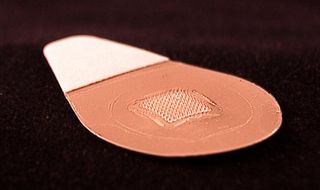Getting a flu shot is now as simple as putting on a plaster
Albeit with MICRONEEDLES

Only about 40 percent of adults in the United States get a flu shot every year, despite the potentially severe consequences for their health. At least some of those are likely uncomfortable enough with the process of getting an injection, or the time it takes to visit a doctor, that it puts them off.
That's why medical researchers have been working for some time on developing alternatives to having a doctor or nurse stick a big needle in your arm. And now, a team from Emory University and the Georgia Institute of Technology have announced that one of them has passed its first clinical trial.
They've created a patch, not unlike a sticking plaster, that has a collection of "microneedles" on the surface. When pressed into the skin, they dissolve - carrying the active ingredient of the vaccine into the body.
In a trial of 100 healthy 18-49-year-olds, participants were randomised into four groups - a patch put on by a nurse, a patch self-administered, a regular injection delivered by a nurse, and a placebo patch put on by a nurse.
The results
The trial not only showed that the microneedle patch was safe and effective, with no adverse reactions reported, but that people strongly preferred the experience over vaccination with a hypodermic needle. No differences were found between the patients who self-administered the patch and those who had a nurse stick it on.
The patches were imaged after use, and the pictures confirmed that the needles had dissolved - meaning that it's safe to discard used patches as regular waste. The vaccine also remains potent in the patch, without refrigeration, for at least a year.
"It's very gratifying and exciting to have these patches tested in a clinical trial, and with a result that turned out so well," said Mark Prausnitz, the senior co-author on a paper describing the results of the test, published in The Lancet.
Get the best Black Friday deals direct to your inbox, plus news, reviews, and more.
Sign up to be the first to know about unmissable Black Friday deals on top tech, plus get all your favorite TechRadar content.
"We now need to follow this study with a phase II clinical trial involving more people, and we hope that will happen soon."
Most Popular


